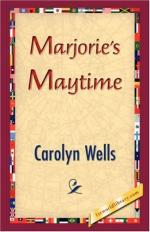But she said no more, for very often special admonitions resulted in special misbehavior.
They were spinning along a lovely country road, which ran across that portion of New Jersey, and the children found much to interest them in the scenes they passed. Mr. Maynard liked to travel rather slowly, and as it neared noon they stopped at a hotel for luncheon. Here they stayed for some time, and the children were delighted to find that there were several other children living at the hotel, and they soon became acquainted.
One girl, about Marjorie’s age, named Ethel Sinclair, seemed an especially nice child, and Mrs. Maynard was glad to have Marjorie play with her.
She was sitting on the veranda embroidering, and this interested Marjorie, for all the girls she knew of her own age liked to run and play better than to sit and sew.
But when Ethel showed them her work, Kitty and Marjorie, and even King, took an interest in looking at it. It was a large piece of white linen, about a yard square, neatly hemstitched, and all over it were names of people.
Ethel explained that she asked any one whom she chose to write an autograph on the cloth in pencil, and then afterward she worked them very carefully with red cotton, taking very small stitches that the names might be clear and legible.
“But what’s it for?” asked King, with a boy’s ignorance of such matters.
“It’s a teacloth,” said Ethel, “to cover a tea table, you know.”
“But you don’t have afternoon tea, do you?” asked Marjorie, for Ethel, like herself, was only twelve.
“No, but I’m going to use it for a tablecover in my bedroom, and perhaps when I grow older I can use it for a teacloth.”
Ethel was a prim-mannered child, and had apparently been brought up in a conventional manner, but Marjorie liked her, and stayed talking with her, while King and Kitty went off to explore the gardens.
“I wish I could make one,” went on Marjorie to Ethel, “where did you get the linen?”
“There’s a little shop just down the road, and they have the squares already hemstitched. It would be nice for you to make one, for you could get so many names as you go on your trip.”
“So I could; I’m going to ask mother if I may buy one. Will you go with me, Ethel?”
Ethel went gladly, and when the girls showed the teacloth to Mrs. Maynard, she approved of the whole plan, for she wanted Marjorie to become more fond of her needle, and this work would be an incentive to do so.
So she gave Marjorie the money for the purchase, and the two girls trotted away to the little shop which was not far from the hotel.
Marjorie found a square just like Ethel’s, and bought it with a decidedly grownup feeling.
“I don’t like to sew much,” she confessed to Ethel, as they walked back. “I’ve tried it a little, but I’d rather read or play.”
“But this isn’t like regular sewing, and it’s such fun to see the names grow right under your eyes. They’re so much prettier after they’re worked in red than when they’re just written in pencil.”




